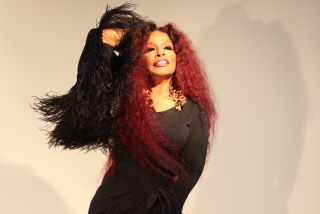O.C. POP MUSIC REVIEW : Khan’s Striking Voice Carries Zeal of Approval
- Share via
BUENA PARK — “Please welcome the living legend, the monument , Nusrat Fateh Ali Khan!”
So was one of world music’s greatest voices introduced Sunday evening at the Buena Park Hotel, and the Pakistani singer had no trouble living up to it.
Khan is something of a commanding physical monument, hefting in somewhere between Elvis and a water bed, but that presence is dwarfed by his voice, a powerful, passionate and impossibly nimble vehicle for the devotional music he sings.
Khan has been a favorite of KCRW’s world-music audience since he stunned listeners at England’s WOMAD Festival a few years ago. His music, however, is part of a tradition going back nearly 1,000 years. He is a Qawwali singer, whose performance is integrally tied to Sufi Muslim mysticism. The expressed aim of such music is to not only spread a message of the love of Allah, but also to form a bridge to that love.
In a manner to which rock music rarely aspires (Van Morrison on a good night being one of the exceptions), Khan’s performances reach for--and attain--an ecstatic, trance-like state that not only expresses a message but embodies it. Though singing in Urdu on Sunday, and occasionally Punjabi, Khan and his eight singers and musicians didn’t need a translator to get the intent of their words across.
Not that most in the audience needed a translator: The majority of the people packed into the 1,000-capacity banquet hall were of Pakistani or Indian origin. The hastily arranged show sold out without even being advertised in the Western press. Khan and his Party (as his performers are called) typically play to dancing, swirling listeners who are swept up in the music. Instead of having that intense feedback to respond to here, he sang to a seated dinner audience, but his performance didn’t seem particularly less involved or driven. Late in his four-hour performance, about 150 people did start dancing.
On disc, Khan sometimes experiments with Western instrumentation and production techniques, used to quite disappointing effect on his 1990 “Musst Musst” album on Peter Gabriel’s Real World label. Sitting cross-legged on a stage bedecked with flowers, he and his Party kept to tradition, with only a pair of harmoniums (hand-pumped organ-like instruments) and tablas (the remarkably expressive hand drums introduced to Western ears 25 years ago by Ravi Shankar’s music) accompanying the wailing voices.
Following Khan through a remarkable weave of vocal improvisation and traditional form, his players responded to his every inflection so closely they could have been the fingers of his hands. His own hands were in constant motion, as his arms gestured and waved with the spirit of the songs. There are a number of family members in his group, including music director and harmonium player Farrukh Fateh Ali Khan and keening, high-voiced singer Mujahid Mubarik Ali Khan.
The set opened with “Allahu Allahu,” a song of praise to Allah, which was indicative of the structure of many of the typically 20-minute numbers. With the harmoniums setting up a meditative drone, Khan repeated phrases, twisting every conceivable inflection and semi-tone quaver out of them.
Even so, he made the words seem like reined horses straining to get loose, building a tremendous tension in the music. And in nearly every song, that tension found release, as the tablas kicked in with an insistent rhythm, the harmoniums shifted to pumping melodic patterns, and Khan and his echoing singers began shouting with an ecstatic abandon.
“Ali Maula Ali,” a song praising the Prophet Ali, was a vocal tour de force. In mid-song Khan shifted to an Indian classical music mode, engaging in an extended call and response with the tablas in which he stuttered out phrases with a percussive speed that easily matched the drums.
Like the great American soul singers, Khan’s remarkable technique never seemed like an exercise, but instead seemed tied to his emotions. Those emotions seemed to run a questing gamut on some numbers, such as one where, in rough translation, he made declarations about the difficulty in finding the love of God, exclaiming at one point, “Even if it takes the sacrifice of my head to get it, I will do it!” and then concluding, “If you want to love God, first love man.”
Curiously like audiences for Nigerian juju music, which often also expresses a spiritual message, Khan’s admirers expressed their appreciation by raining dollar bills on the performers. During one song, a helper crawled about the stage collecting and counting the bills, a sight that couldn’t have seemed more distracting or incongruous if he’d used a vacuum cleaner.
The ballroom could have been an acoustical nightmare, but the sound was surprisingly good, after a shaky start caused by a florist who spilled some water and inadvertently shorted out some of the sound system.
After playing nearly 2 1/2 hours, Khan stopped, but it turned out that was just for a tea break. When he resumed he reportedly kept going until 1:30 a.m.
More to Read
The biggest entertainment stories
Get our big stories about Hollywood, film, television, music, arts, culture and more right in your inbox as soon as they publish.
You may occasionally receive promotional content from the Los Angeles Times.










